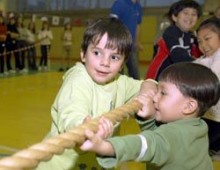For this weekend the problem of family outings was settled: the Ukrainian-Japanese Center at the Kyiv Polytechnic Institute (KPI) invited everyone to take part in a sports festival that is held every year toward the end of the fall in all Japanese schools. This is the Japanese version of Veseli Starty competition.
The KPI sports complex gathered several dozen Ukrainian and Japanese families. There were no ethnic differences about the teams; there were made up of both Ukrainian and Japanese contenders. Before the emcee announced the start of the competition and introduced the competing teams called by names used in the Ukrainian and Japanese national flags: White, Red, Blue, and Yellow.
There was a brief warm-up guided by the Japanese coach Akamura; the athletes raised their hands, jumped in place, bent their bodies left and right to the accompaniment of music — they were eagerly joined by people from the audience.
Then they started the first event — tamaire. This is a game in which small balls are thrown into a basket that looks like the one used in basketball, only much lower. The youngest participants, up to 11 years of age, participated in this game.
“Festivals like this always attract large audiences in Japan because we love and respect sports, and these competitions are merry and active events,” says Agawa Hiroyuki, a Japanese language lecturer at the KPI National University, and adds: “Everyone can take part in it, whether an athlete or otherwise. Just look at the children running round the gym; their eyes are shining with happiness (Hiroyuki has a fluent command of Ukrainian after studying the language for several years. — I.F.).
There were also races, the tug of war, and other merry contests. The main thing was the sporting spirit. After several competitions the contestants no longer cared about the points scored by their teams. Friendship was the watchword: “Everyone will get prizes,” said the participants and the fans. The Ukrainian-Japanese center invited Kyiv schoolchildren who study Japanese, so they took part in the contests with a special purpose in mind: to check their knowledge in practice.
“Children who are studying Japanese have an opportunity to communicate with native speakers; those who have mastered the language to a certain degree can communicate with Japanese children, the more so that these children are very sincere and outgoing,” says Maria Isaieva, a lecturer at a Kyiv Oriental Languages gymnasium. In fact, she attended the festival with her family, so she was both a participant and a fan. She added, “Our gymnasium took part in the first Japanese sports festival last year. There were only some fifty participants. Today, there are many more of them, which is proof that such contests have strong potential.”







